DASHNOR KALOÇI
Memorie.al publishes excerpts from the book “Writers and artists under the communist dictatorship” by Dashnor Kaloçi, which contains an archival document with the secret report of 1974 for Ramiz Alia, regarding the visit to Albania of professors from Kosovo, Ali Hadri, Skënder Riza and Emin Pllana, where among other things it is said that: Ali Hadri said that in the history of the district of Elbasan should be put the names of Fadil Hoxha and Xhavit Nimani, as members of communist groups… ?!
As we have seen in some of the other previous chapters of this book, in the early 1970s, many personalities of Albanian education, culture and literature visited Albania, which was done in the framework of a common protocol that had signed official Tirana with the Socialist Autonomous Province of Kosovo. In this context, sometime in the early summer of 1974, a delegation from Kosovo came to Albania, where among others were the well-known academic and historian, prof. dr. Ali Hadri, prof. dr. Skënder Riza and pedagogue Emin Pllana. During their stay of almost a month in Albania, they were accompanied by Petrit Sinani (employee of the Institute of History), who according to the “rules” by which the communist regime of that time operated, has compiled a report-information that more it was then sent to the Central Committee of the ALP and personally to Ramiz Alia, the relevant secretary of the Central Committee of the ALP covering party, education, art, culture and propaganda. Like almost all reports-information of this nature (for Albanians coming from Kosovo, Montenegro and Macedonia) this one of the companions Petrit Sinani, has been compiled in detail about everything they have done, met, visited and expressed “friends” From Kosovo during their stay in Albania. Among other things, what stands out in the information report is the conversation that professors from Kosovo had about their colleague, prof. dr. Rexhep Qosen, who had also visited Albania some time before them (which we have seen in one of the previous chapters) and between him (Qose) and colleagues from Tirana, a “conflict” had been created or rather had a debate was born that had to do with the history of Albanian literature of socialist realism, for which Qosja was “accused”, that: “He had put in a bag, the history of Albanian literature of socialist realism, with that before the war”. For more on the opinions of honored professors from Kosovo for their colleague, Qosja and their entire visit to Albania, let us know the report-information in question which we are publishing in full and without any cuts. Although there is no note from Ramiz Alia in the document in question, it seems that he saw it, as there is the signature (signature) of his chief of staff, Ilo Kodra, who put the note of archiving the material.
R E L A C I O N
On the stay in our country of Kosovar scholars, Professor Doctor, Ali Hadëri, Professor Doctor, Skënder Riza and professor, Emin Pllana
Based on the protocol of scientific teaching cooperation between the State University of Tirana and that of Prishtina, on June 2, 1974, a Kosovar delegation led by the rector of that University came to our country. The above-mentioned comrades were also part of this delegation.
On June 2, these friends were received in Hani i Hotit by Selami Pulaha – Deputy Director of this Institute.
On 3.VI.’74 Ali Hadri, Skënder Riza together with his wife and Emin Pllana, were received in the directorate of this Institute, where our party participated, Stefanaq Pollo, Selami Pulaha, Niko Deçka, Stavri Naçi, Kristo Frashëri and Petrit Sinani.
In this meeting they talked about the scientific research work that they would do during their stay in Albania.
The purpose of their arrival in Albania was the use of archival materials for different periods of the history of the Albanian people.
The length of stay was different. Ali Hadri stayed from 2 to 28 June 1974, Skender Riza from 2 to 17 June, and Emin Pllana from 2 to 21 June 1974.
During this period, they worked at the National Library and the Institute of History, where, according to certain rules, the materials needed were used.
From 3 to 12 June Skënderi worked 2-3 hours a day in the Library of the Institute of History and spent the rest of the time, with his wife, walking and visiting Mehmet Luti’s family (Skënder’s wife, Mehmet Lutin and had uncle’s son).
Ali Hadri and Emin Pllana also worked at the Institute of History, at the National Library during this period. The materials used were from different periods. Ali and Skënderi worked on the problems of the League of Prizren, while Emini worked for the years 1900-1909. We provided the necessary materials. Skënderi and Aliu also planned to give a lecture. Skenderi held it on June 13, 1974 with some history specialists at the Institute, to clarify some thoughts about the history of the last 30 years of the 19th century, for which he had prepared a monograph that he would soon send to the press.
The topic of his lecture was “The role of some international organizations in Albanian history based on Ottoman and English sources.” In addition to this discussion, Skënderi gave information about some materials he had discovered in the archives of London and Istanbul, about the history of the Albanian people. The thoughts they gave to our students, he called quite valuable. Skënderi wanted, before publishing any work on the history of Albania, to discuss it with our specialists and to help with archival materials as much as he could.
On June 28, 1974, Ali Hadri gave his lecture “Yugoslav Historiography on the League of Prizren”, also at the Institute with a specialist in history.
In addition to work on archival research, visits were made to several cities in Albania. On the 6th, Skënderi and his wife went to Fier. There they visited Apollonia and at noon of the same date went to Vlora, where they visited the cemetery of martyrs and some other centers. Petrit Sinani accompanied them on these visits.
On 7.VI.’74, they left for Saranda, where they stayed until 10.VI.’74. On the same date they left Saranda for Berat. They only stayed here for a few hours. In Berat, Skënderi met in my presence, Zyma Berisha, pedagogue of the Albanian language in the branch of U.SH. T. located in Berat. Zyma was from Peja and came to Albania 13 years ago, Skënderi had a student in Peja.
On June 12, Skënder’s wife was sent to Elbasan, where she stayed for three days with her uncle’s daughter, who was married there to Skënder ……………., A driver in Elbasan Tourism.
The day they left for Saranda, Skënderi seemed upset. As he himself said, the reason was that the day before on 5.VI.’74, the rector of the University of Prishtina left for Saranda, and Skënderi wanted to go with him and his wife. But, according to him, the rector did not want to travel with Skënder and his wife; this had angered him so much that he expressed the thought that “we will return to Pristina as soon as possible”, as if he had children alone and that the eldest son would leave for Poland. With our intervention he was convinced, and when we went to Saranda, the situation changed.
During the talks in Saranda, Skënderi spoke with hatred for Hasan Kaleshi, with whom he had deep contradictions. These contradictions, according to him, were based on Hasan’s unjust attitude towards the history of the Albanian people. Skenderi called him an “anti-Albanian” and a forger of history, a man who had been sold to Serbs. “Our interest – he said – wants us to have unity (the word for Kosovo), and to take all the direction in Kosovo. “But there are also people like Hasan who deny the nation.” “Recently, Skënderi said, an anti-party group was captured in Yugoslavia. “Most of this large group are Serbs, they rose up against Tito, but they were all discovered and captured in a very short time.” “This,” he said, “is in our favor, because it weakens the position of the Serbs and some of their tools.”
In Saranda Skënderi and his wife were very satisfied. On the way to Saranda, his wife expressed great admiration for the great changes that have been made in Albania.
Both Skëndri and his wife expressed their satisfaction that all people in Albania work and live equally. “With us,” said Skënderi, “the prices are very high and no one sees people entering the premises like you. “I, for example, said, ‘I never went to Bozhun with my wife because it is expensive.’
His wife was very impressed by the work done by the women. “In our country,” she said, “women do not work, there are no jobs.” Very good words were said for great order and tranquility, as well as for the automotive order.
Skënder’s wife fled from Tirana to Peja in 1946. She knew Tirana well and was very surprised when she saw all those changes. “I cannot find the way to my uncle’s house, he said, Tirana was not like that.”
His wife stayed in Elbasan for three days and was very happy that we fulfilled this wish.
Skënderi expressed his deep gratitude for the warm welcome we gave him and the woman, because, “I, he said, would support the woman at my own expense, while you did not allow me to spend any money”.
I did not have the opportunity to associate with Emin Pllana alone, except for 2-3 cases that we met at the Hotel “Dajti”, and at the Institute. Emini did not move from Tirana and spent all his time working in the library.
We met Ali Hadrin on June 3, 1974, when the reception took place at the Institute and then on 14.VI.1974 the day they left for Saranda. Going to Saranda, we stayed in Lukova, where we went to a bookstore to buy a book. Inside the shop was a Kosovar, an immigrant who came to Albania 15-20 years ago and works in Lushnje as a history teacher. Ali pretended not to see him, but he (his name was Xheladin Ferizaj) said to Ali: “How are you Ali Hadri, do you know me”. “You look Kosovar to me,” Aliu said, “but I do not remember you.” Ali seemed reluctant to talk and immediately left the store as soon as he bought the book.
That night when they arrived in Saranda, he was unhappy that we did not give him an apartment in the hotel, because according to him, the room he had was not suitable for work. “I have very good conditions in Pristina,” he said. During the whole time we stayed in Saranda, he repeated the work of the apartment several times, saying that “you did not create good working conditions for me”. We went to Butrint twice, once to Delvina, saw a State Variety show and one day in Borsh. During the talks, Ali often talked about himself and the good conditions he had in Kosovo, about his personal car and about the house he had built in Peja. He expressed respect for our historian scholars as well as for the preparation of students in Albania. “There in Prishtina, students do not prepare much and most of them remain. “The conditions are very difficult, some live in basements and sometimes they protest,” he said once.
He had no sympathy for Hasan Kaleshi and expressed the opinion that he should serve someone else. He talked about hatred and Emin Pllana. Regarding the lecture given by Rexhep Qosja in Albania and the discussions that took place about his lecture by our researchers, Aliu expressed the opinion that Rexhep was not right. “They did very well, Rexhepi needs to lower his nose a little.” Evaluated the discussion of sh. Alex Buda, Jorgo Bulon and Koço Bihikun. Ali wanted the works done in our country for the period of the National Liberation War to be seen by him as well.
This discussion arose that Aliu, while browsing the book “VI Assault Brigade”, in the part that talks about the passage of this brigade in Yugoslav lands, came across a paragraph where it was said by the author, that the Albanian National Liberation Army liberated some lands of Yugoslavia”. This he said is very crooked and unacceptable. “I know,” he said, “that Comrade Enver defines this right, but the author has made a mistake.” materials and misunderstandings are created in this regard”. Following this conversation, Aliu said: “I also have remarks about the history of Elbasan. It does not talk about Kosovar boys who have militated in communist groups, the names of Fadil Hoxha and Xhavit Nimani should be mentioned.” For this reason, it seems that the writings on the National Liberation War should have been given to Ali: to give his opinion. He talked a lot about his work and called himself the only historian who has given genuine works for the region of Kosovo.
He often spoke about the changes that have taken place in Albania and said “All these changes are the work of the Party with Comrade Enver at the helm. Comrade Enver and your Party is very strong, it has gone through many storms: e.g. in the time of Koci Xoxes have been very difficult situations. Koci was a scoundrel, Rankovic’s agent. “I have seen all the documents in Belgrade, of Koçi’s connection with Rankovi…” “One who does not see the changes that have taken place in Albania during these 30 years, is the same as a man who does not see the forest in front of his eyes, but sees a crooked tree in the middle of this great forest.” One day he also inquired about the driver’s financial situation, asked him how much his monthly salary was and whether it was enough or not.
Tirana, on 4.VII.1974 Companion
(Petrit Sinani)
Memorie.al




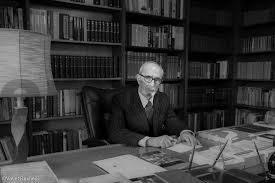
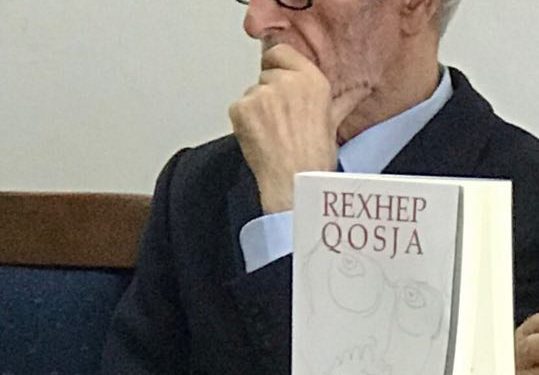
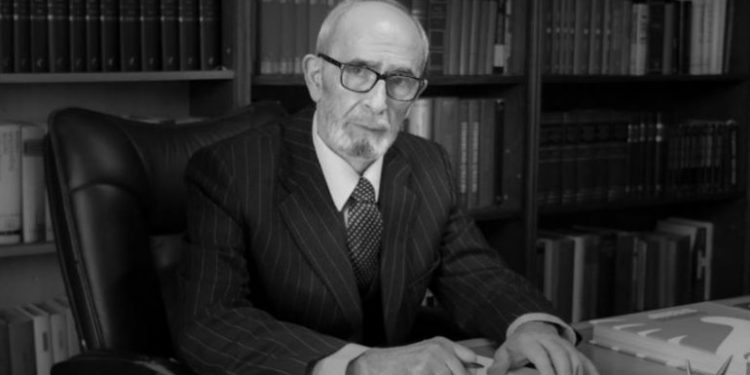
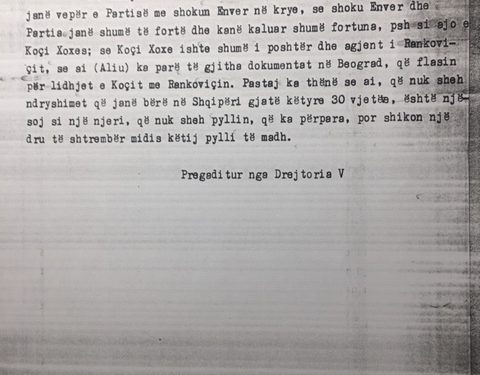
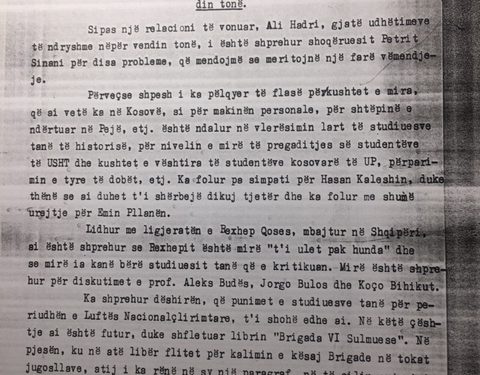
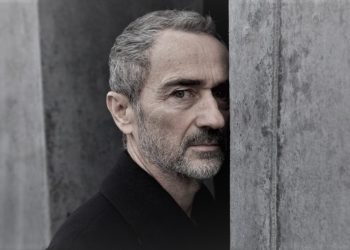
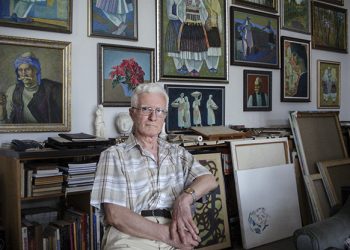
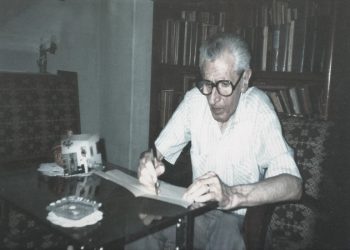
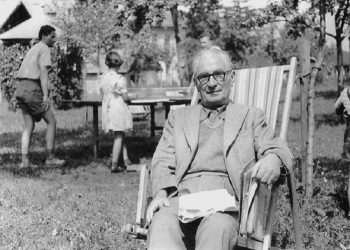

![“Count Durazzo and Mozart discussed this piece, as a few years prior he had attempted to stage it in the Theaters of Vienna; he even [discussed it] with Rousseau…” / The unknown history of the famous Durazzo family.](https://memorie.al/wp-content/uploads/2026/02/collagemozart_Durazzo-2-350x250.jpg)
